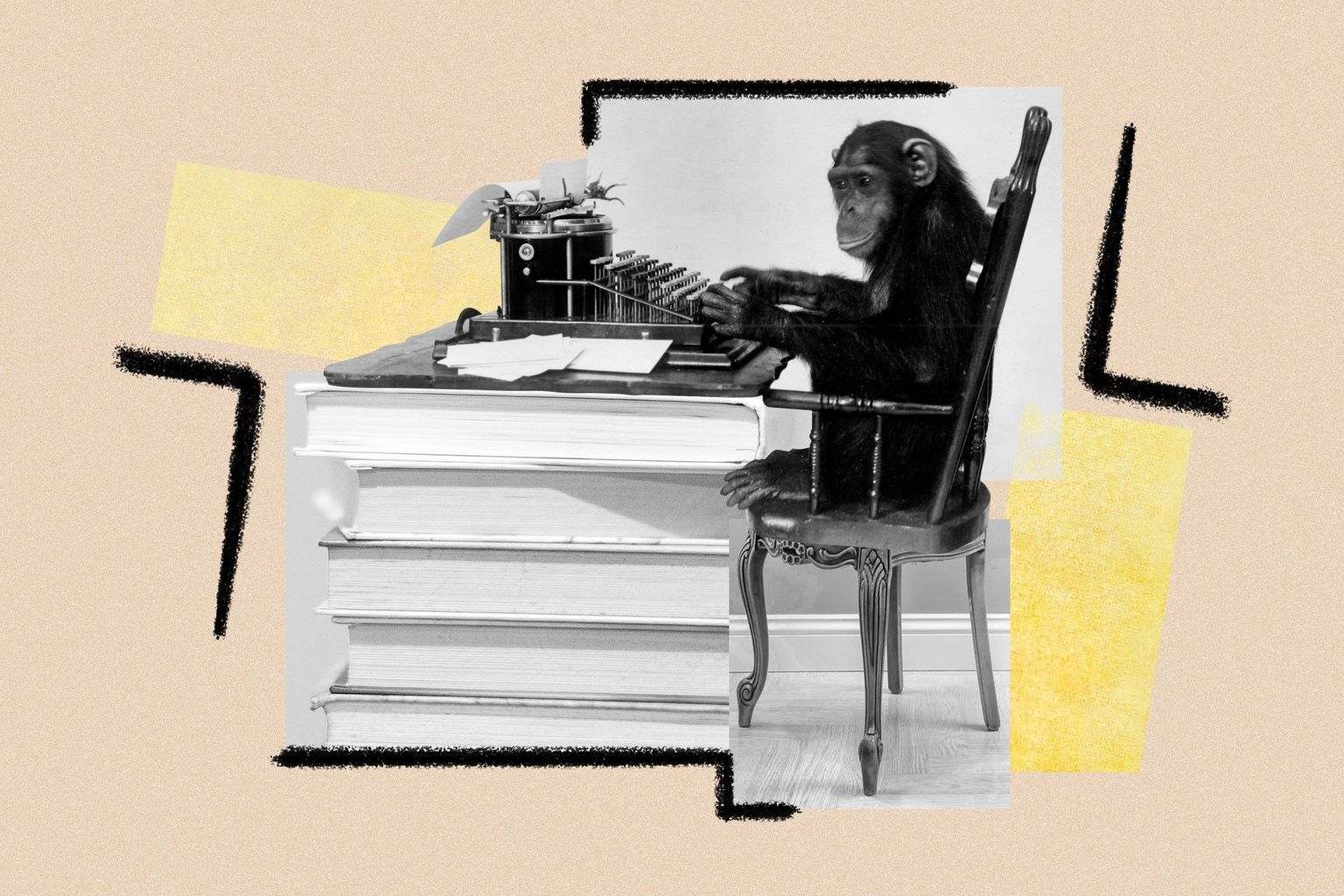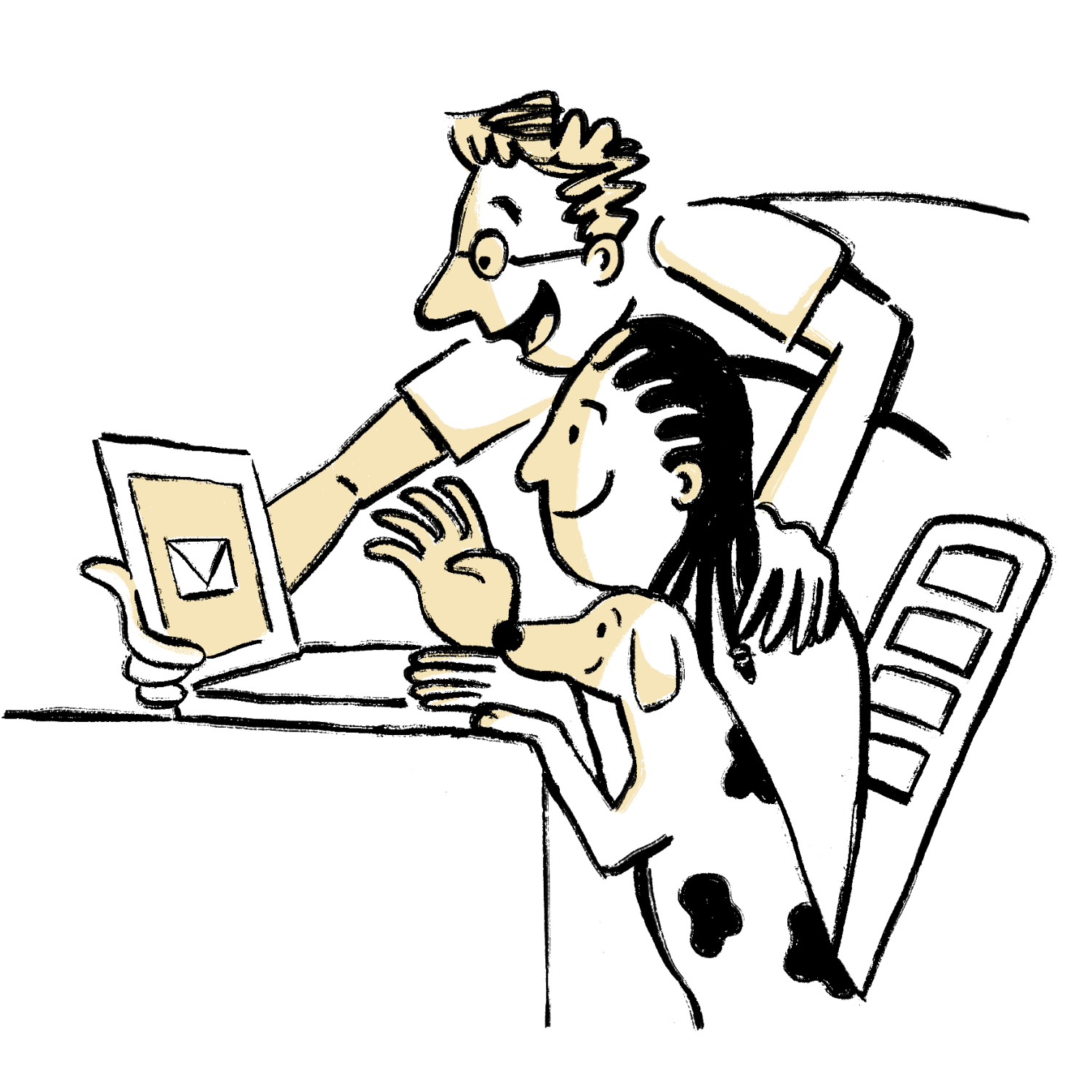We need to talk about storytelling
They say evolution made us into storytellers. But in a world drowning in narrative, can we learn to be something else?

Photo illustration: Greta Larkins/Alamy
Maybe you've heard this one before.
It's a warm evening—November, maybe, though that word won't mean anything for a few geological eras. The air is thick with the smell of whatever the earth smelled like six million years ago, as a few of our chimp-like ancestors climb down from the safety of the trees and onto the open plains. Life is good on the ground—they can forage for new kinds of food, explore new territory, give their arms a rest. But it isn't all sunshine and prehistoric roses: without sharp claws or tough hides, our plucky heroes are vulnerable to all manner of peril. To survive, they will have to rely on something far more powerful than muscle: communication.
A couple of well-placed grunts sufficed at first, warnings about predators—sharp barks to signal a snake, low growls to alert the group to a lurking leopard. Over time, these basic signals became more nuanced, evolving into intricate maps of threats and opportunities, then growing into vivid tales of survival, passed down through generations. Our protagonists start to tell ever-more complicated stories, not just to pass the time, but to pass on information. "Beryl ate those berries,” our neolithic Ira Glass warns. “Now Beryl's dead. Better stick to bananas." Those who learned to spin the most memorable cautionary tales saw their children survive, their techniques copied, their warnings heeded. And so storytelling became woven into our DNA, pushing us to share, to warn, to teach, to connect.
It's a solid theory, as far as evolutionary science goes. But more importantly, it's a good story, replete with relatable protagonists, an existential conflict, the vague outlines of a narrative arc and a satisfying conclusion. Given its tidy logic and three-act structure, it’s not hard to see why it has resonated so widely among people looking to explain our species’ obsession with narrative, solving as it does the puzzle of how the naked ape conquered the planet while drawing a straight line from cave art to Shakespeare to Star Wars.
And resonated widely it has. Google 'storytelling animal' and you'll be greeted with a torrent of books, LinkedIn posts, TED Talks (over 300 at last count), MasterClasses, think pieces and national festivals, each making the case with near-religious conviction that our ability to spin yarns is what separates us from the rest of the animal kingdom, narrative is the glue holding our civilisation together. Master the science of storytelling, the life-hackers of the internet promise, and you'll crack the code of human nature itself: why we trust strangers, forge alliances, spread religions and even vote against our own interests.
Like I said, solid theory. But what if it’s also a little bit bullshit? I don’t mean evolutionary psychology, which biologists and psychologists already accept is bullshit. I mean—and I say this as someone who spends their days editing a magazine about storytelling—the notion that stories are the skeleton key that unlocks all human understanding. Over the years, we’ve gone from merely trying to understand why we tell stories to insisting that they’re the answer to every conceivable problem we humans might encounter. Climate change, struggling businesses, the left, the right, the centre, even our personal health—storytelling, we’re told, can fix it all, bridging divides, rebuilding trust and solving crises one compelling narrative at a time.
We’ve gone from merely trying to understand why we tell stories to insisting that they’re the answer to every conceivable problem.
To be fair, storytelling arguably can help. It can spark change, inspire movements, connect people in ways that raw data never could, so on and forth. But as we’ve dragged it from the campfire into the boardroom, something odd has happened. Storytelling isn’t just a tool anymore; it’s a job title, a brand, a commodity. A quick glance at LinkedIn reveals how deeply the professionalisation of storytelling has seeped in, with everyone from digital marketers to pharmaceutical reps to management consultants now touting themselves not as strategists, analysts, or innovators, but as 'storytellers.'
Some of these people plausibly are storytellers, or at least are some of the time. (What is a pitch deck if not a myth about the future told via Canva template? A 30-second toothpaste ad a condensed Hero’s Journey with a couple of CTAs for good measure?) Others have a more tenuous claim to the title: digital marketers no longer sell products, they craft brand narratives. Brand strategists don’t build campaigns, they tell gripping sagas of consumer loyalty. Even architects and bankruptcy lawyers have joined the gold rush—the former presumably crafting narrative with bricks, the latter weaving stories of death and rebirth in spreadsheets. It’s enough to make you want to shout “No, fuckhead, you are not a storyteller—you’re a roller coaster designer!”, which as it happens is exactly what graphic designer Stefan Sagmeister did when he heard a roller coaster designer call themselves a storyteller.
I know what you’re thinking: a writer, complaining that his craft has been commodified by capitalism. Not exactly a sob story people are lining up to hear. But this isn’t about keeping storytelling pure or sacred—if those days ever existed, they’re long gone now. The problem isn’t really capitalism at all. It’s our growing inability to think or communicate in any way but story. We’ve become so dependent on narrative as our primary mode of understanding that we’ve forgotten how to engage with ideas that don’t fit neatly into a tidy arc. And this goes for writers and journalists (me included) as much as brand strategists and social media gurus.
I'm far from alone in questioning writers' fixation on storytelling. A decade ago, just as narrative podcasts and storytelling events were turning personal tales into a cultural phenomenon, Australian writer Maria Tumarkin had started to push back. In her prescient 2014 essay 'This Narrated Life', Tumarkin argues that our obsession with storytelling is creating a culture where complex ideas are increasingly forced into neat narrative packages, regardless of whether they belong there. When every thought must be transformed into a journey, Tumarkin says, we risk losing something essential: the ability to engage with ideas that resist easy narration. And that’s as true for writers and artists as it is for ad execs and digital marketers.
Tumarkin opens the essay with Joan Didion’s famous line, “We tell ourselves stories in order to live,” but notes that she had initially planned to start her piece with a story of her own. Then, she says, “I thought again.”
“Starting an essay or any substantial piece of journalism with a story is pretty much the law these days,” Tumarkin writes. “The reader will swallow your story and then here she is with your shiny hook in her innards and you can start pulling on it this way or that. I am sick of reading these opening stories, sick of their intent to seduce; they remind me of the candles, wine and music put out by a man who wants to sleep with you. Here he is waiting for you to be two-thirds through the first glass and then, mark my words, he will make his move.”
That example might seem extreme—whatever you might say of their motives, literary writers, even the male ones, aren’t usually telling stories just to get into your pants. But when you’re wielding tools designed to seduce, you might want to stop and ask what you’re really trying to achieve. Because stories do wield power. And they do it by bypassing our rational defences.
In 1817, the English poet and philosopher Samuel Coleridge said that a good story requires "the willing suspension of disbelief" from its audience, coining a phrase that would become the bedrock of narrative theory for the next two centuries. Key to Coleridge's theory is the word 'willing': the notion that we consciously choose to set aside our scepticism and let ourselves be carried away by the tale. But some modern theorists argue it works the other way around. Writing in the Harvard Business Review, literary scholar Jonathan Gottschall offers a counter theory: “We don’t will our suspension of disbelief,” Gottschall says. “If the story is strong, if the teller has craft, our suspension of disbelief just happens to us, with or without our permission.”
Perhaps they survived not just because they could tell tales around the campfire, but because they also knew when to shut up and listen.
This power to bypass our defences, Gottschall argues, is what makes stories so potent—for good, or ill. A former storytelling evangelist himself, Gottschall traces this narrative power to our fundamental nature as emotional beings. “Successful stories generate powerful feelings, and strong feelings act as a solvent on our logic and our scepticism. To put it positively, good stories—fictional or not—make us more open-minded. To put it negatively, they make us a lot more gullible.”
This, Gottschall argues, is why an emotion-drenched story "is at the heart of every con job," from Theranos and WeWork to QAnon and the Iraq War. It's also why peer-reviewed journals deliberately exclude narrative techniques from scientific reports—emotion clouds objective analysis. As Maria Tumarkin put it, stories “can lead you down foxholes you cannot fact-check your way out of,” the form embedding falsehoods and mistruths so deeply in our psyche even as it attempts to excavate a deeper 'truth'.
The aversion to storytelling appears to be gaining new ground. Recent years have seen an anti-storytelling symposium, books like Seduced by Story and The Story Paradox, and critics such as Hannah Gadsby and Rebecca Solnit examining the perils of narrative. Their arguments highlight how stories can oversimplify, manipulate, or obscure. But while wariness about the power and dominance of narrative, born no doubt out of the kind of narrative exhaustion that has followed the This American Life-ization of everything from journalism to marketing, isn’t new. Two-and-a-half-thousand years ago, Plato called for storytellers to be banished from the republic, warning that their art “candy-coats” dangerous ideas, seducing audiences away from truth with their beguiling craft.
Our assumption that narrative has always held a central place in storytelling may also be overstated. Writing in The New Yorker, literary critic Parul Sehgal notes that our earliest 'stories' often bore little resemblance to anything we’d recognise as narrative. “Religious texts were delivered as often in riddles as in parables,” she writes, while “much of the Quran is non-narrative”. Even the classics we regard as laying the foundations of modern storytelling often lacked the devices we now see as fundamental to the form: “Gilgamesh is woven out of speeches,” Sehgal writes, while “Beowulf scarcely has a causal plot”. Viewed this way, storytelling as we know it begins to look less like an ancient, universal instinct and more like a modern—and culturally specific—invention.
Perhaps those ancient texts were onto something. After all, life rarely unfolds in neat three-act structures. Most experiences resist the kind of narrative packaging we’ve grown fond of placing them in—they’re messy, inconclusive, riddled with inconsistencies and loose ends. We may, as Didion writes, tell ourselves stories in order to live. But maybe there’s wisdom in embracing other ways of making sense of the world: through analysis, through poetry—hell, maybe even through silence.
Which brings us back to those first storytellers, our ancestors on the savanna. Yes, they may have needed stories to warn about poisonous berries and lurking predators. (Though, once again, we can’t prove that they did!) But they also needed other tools: observation, logic, intuition, instinct. Perhaps they survived not just because they could tell tales around the campfire, but because they also knew when to shut up and listen to the wind in the grass, to read the sky, to think without narrating. Perhaps it's time we relearned that skill—the lost art of understanding without story.
